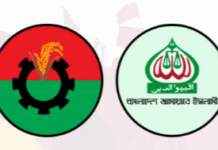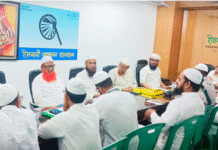
Referring to the 1971 war crimes cases, Jamaat-e-Islami Ameer Dr Shafiqur Rahman today (27 May) claimed that 11 senior leaders of the party were oppressed and effectively subjected to judicial killings through false cases, mock courts, and false testimonies.
He made the remark while addressing a press conference, which started at 11:30am, organised by the Jamaat at the Muktijoddha Hall of the Institution of Diploma Engineers, Bangladesh (IDEB) at Kakrail in the capital.
“The verdict of ATM Azhar has served justice. All praise and thanks to the Almighty Allah — Alhamdulillah,” he said, reacting to the Appellate Division’s verdict this morning — which acquitted Jamaat leader ATM Azharul Islam from a death sentence in a 1971 war crimes case.
“The kangaroo court has taken our leaders from us. We will never get them back,” Dr Rahman stated, expressing that these individuals, had they been alive, would have served the nation with integrity and competence, bringing qualitative changes to politics.
He accused the authorities of extensive forgery and deceit in conducting these trials. Referring to former Chief Justice Surendra Kumar Sinha’s writings, Dr Rahman claimed that the judicial process was orchestrated not for justice but to systematically eliminate political adversaries.
Highlighting specific incidents, he mentioned the execution of Abdul Quader Mollah, alleging that on the night of his forced execution, his family members were physically assaulted and detained. He also pointed to the “Skype scandal” and the testimonies of witnesses like Sukharanjan Bali as evidence of the trials’ lack of fairness.
Dr Rahman emphasised that these actions disregarded both national and international legal standards, driven solely by the desires of those orchestrating the courts.
“They have been removed from this world, but they will remain in our hearts. We will remember them through our actions,” he affirmed.
Referencing international perspectives, he said, “The British court has termed it ‘genocide of justice,’ and now Bangladesh’s court acknowledges it as a ‘miscarriage of justice.'”
Addressing journalists at the time, he said, “We did not seek revenge, you have seen that. We want justice.”
“This verdict makes it clear that it was a deliberate act of leadership genocide. Responsible leaders are not born in every household. Their objective was to leave the party leaderless,” he added.
“This verdict proves that truth cannot be suppressed. It breaks through the clouds and shines with brilliance,” he said.
“If given the opportunity to serve the people, we will end the politics of vengeance and discrimination,” he concluded.









